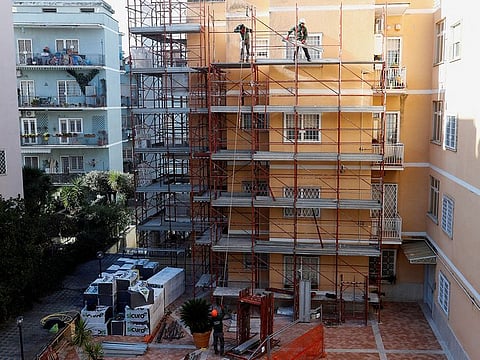How Italy's generous green homes scheme turned 'wicked'
The superbonus scheme was introduced by former premier Giuseppe Conte

Rome: An Italian scheme to make homes more energy efficient has been wildly popular, but the government is seeking to rein in its "out of control" costs amid fears it could send the deficit soaring.
The "superbonus" scheme, which can be used for anything from insulation to solar panels, new boilers and windows, was introduced in May 2020 to boost the economy after the coronavirus lockdown.
Environmentalists were sceptical about its benefits but Italians rushed to take advantage of the programme, in which the state paid 110 percent of the cost of making homes greener, with the subsidy delivered via a tax credit or tax reduction.
As intended, it boosted the construction sector - but it has so far cost the state 61.2 billion euros ($64.8 billion), according to the finance ministry.
Prime Minister Giorgia Meloni, whose coalition government took office in October, said last weekend the situation was "out of control".
She said the scheme had led to fraud worth nine billion euros, while the tradeable nature of the tax credits had "generated a sort of parallel currency, and that parallel currency risks having a devastating impact on the budget".
Finance Minister Giancarlo Giorgetti went further, describing it as a "wicked policy".
Lorenzo Codogno, a former chief economist at the Treasury, told AFP that attempts now to quantify the impact of the scheme on Italy's strained public finances could be "a wake-up moment for financial markets".
He warned Italy's deficit could be revised up substantially, while both the construction sector and the government "could have liquidity problems".
Italy's deficit was an estimated 5.6 percent of GDP last year and set to fall to 4.5 percent in 2023, but revised figures potentially incorporating the superbonus scheme are due out on March 1.
Construction boom
The superbonus scheme was introduced by former premier Giuseppe Conte, whose populist, environmentalist Five Star Movement led the coalition government at the time.
It allowed homeowners to either deduct the cost of work from their taxes over several years or sell the tax credit to their builder, who would sell it to a bank, which would then claim the money from the state.
Angelica Donati, the president of national constructors' association ANCE, told AFP the bonus had been "fundamental in the aftermath of Covid-19, both for reviving the Italian economy as well as restarting the construction industry".
The construction sector grew by 21.6 percent in 2021, helping fuel Italy's post-pandemic boom.
But the scheme generated much more work than originally forecast and banks stopped buying credits last year, leaving some construction companies in the lurch.
Meloni's government has already sought to restrict the subsidies, reducing the superbonus from 110 percent to 90 percent last year.
Then last week it put a sudden stop to the use of the tax credits as it tries to work out how to unfreeze existing credits for an estimated 19 billion euros' worth of work that has been carried out but not yet paid for.
ANCE said some 25,000 construction companies were at risk of folding.
Superbonus users can now only receive money back from the state via tax breaks - but that mostly benefits those on higher incomes.
Wasted opportunity
The government is looking into possible alternatives to the credit system. Climate campaigners hope it will also change the bonus' scope.
Experts have lamented what they see as a wasted opportunity to engineer a cultural shift towards properly green housing.
In a study last year, the Bank of Italy said the superbonus was "not a cost-effective way" to tackle climate change.
Matteo Leonardi, co-founder of Italian climate change think tank ECCO, said it lacked "ambition".
"It has not been linked to climate targets, which is what would have justified the costs," he told AFP, adding that renovations had only to boost efficiency by two energy classes.
It also did not sufficiently promote innovative but less familiar technologies, such as heat pumps.
But Leonardi said for all its faults, the superbonus had value if radically revised to meet more ambitious targets.
With the tax credits gone, the government is now "just giving a lot of money to high-income families to install gas boilers".



